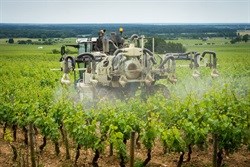
Top stories






More news


Marketing & Media
Ads are coming to AI. Does that really have to be such a bad thing?














"Political parties and politicians who have South Africa's best interests at heart must refrain from making statements that unnecessarily tarnish agriculture's image, thus undermining confidence and ultimately having a negative impact on exports, employment and food security," Möller said.
He said there were two agenda items in particular that affect agriculture closely and on which leading political parties have very different viewpoints, namely land reform and labour matters. In respect of both issues, much work had been done at policy and industry level over the past year. And yet it seems that the potential that these matters have for canvassing votes is being exploited by politicians, in a campaign which is more intense than in previous elections, to the detriment of the industries' development and the interests of participants therein.
"Minister Nkwinti's consultation process on land reform has been more or less finalised and legislation and evaluation of implementation plans, as proposed, among others, in the National Development Plan are now considered. Judging from recent proposals and statements made by political leaders, however, there remains unfinished business at policy level which poses serious threats to land ownership.
"With regard to labour, there has also been intense consultation and inquiries at national, regional and commodity level, amongst others by the Vulnerable Workers Forum, which were facilitated by Deputy President Motlanthe. Many of the issues identified can only be resolved outside agriculture and various authorities probably have the biggest contribution to make towards lasting solutions," according to Möller.
South African commercial agriculture has to date made a massive contribution to stable national food security despite the lack of protection and support it receives compared to those of its competitors within the international trade arena. This drives structural changes in the industry which, amongst others, results in fewer farmers operating bigger farms and mechanisation replacing labour.
Some of these changes were also expedited by policy and legislation, which had to be offset by making choices regarding the approach to farming and farming systems. "These complex realities must be taken into account when talking of or about agriculture," said Möller.